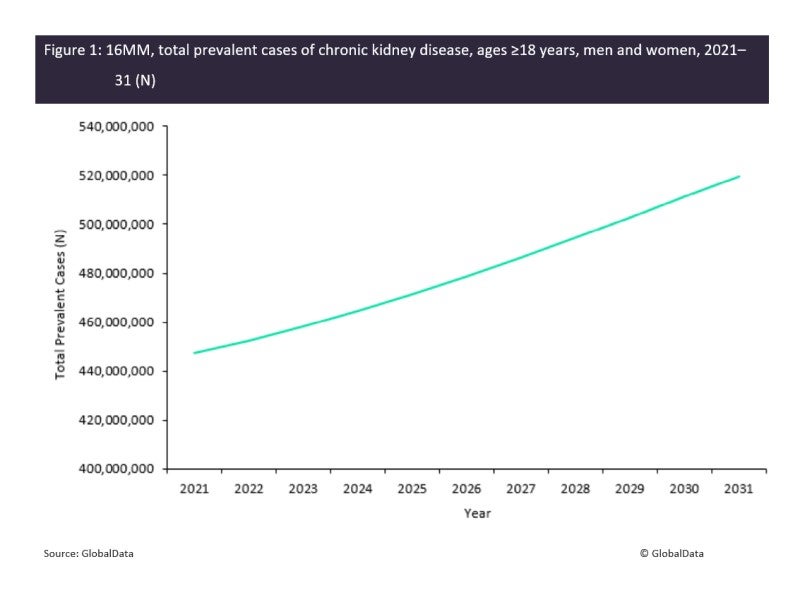Chronic kidney disease (CKD) is a condition characterised by a gradual loss of kidney function over time, leading to the accumulation of excess fluid and waste in the body. The symptoms of kidney disease, such as fatigue, nausea and muscle cramps, are often nonspecific and do not become apparent until irreversible kidney damage has occurred. Risk factors for CKD include high blood pressure, diabetes and heart disease. Omega-3 polyunsaturated fatty acids (PUFAs), primarily found in seafood, are essential for cell functioning and have had beneficial effects on kidney function in animal studies. The results of a pooled analysis published in January suggest that omega-3 PUFAs may play a pivotal role in CKD prevention in humans. If placing more emphasis on omega-3 PUFA intake becomes a standard recommendation to help prevent CKD, GlobalData epidemiologists expect the total prevalent cases of CKD in adults to decrease in the 16MM (Australia, Brazil, Canada, China, France, Germany, India, Italy, Japan, Mexico, Russia, South Africa, South Korea, Spain, the UK and the US).
The meta-analysis, conducted by Kwok Leung Ong and colleagues and published in The British Medical Journal, pooled the results of 19 prospective studies from 12 countries examining omega-3 PUFA biomarker data and incident CKD. These studies based incident CKD on new-onset glomerular filtration rate (GFR), a blood test that checks how well the kidneys are working. A GFR below 60mL/min/1.73 m² for more than three months is indicative of CKD. Out of 25,570 participants, a little more than 19% developed incident CKD during follow-up. After accounting for other risk factors, such as age, smoking and physical activity, the authors found that higher levels of total seafood omega-3 PUFA levels were associated with an 8% lower risk of developing CKD. Furthermore, participants in the highest 20% for total seafood omega-3 PUFA levels had 13% lower risk compared with those in the lowest 20%.
In the 16MM, GlobalData epidemiologists expect the total prevalent cases of CKD in men and women to increase over the next decade, approaching 520,000,000 cases by 2031 (as shown in Figure 1). However, if specific dietary recommendations, including increased omega-3 fatty acids intake, are established and widely adopted to reduce CKD risk, total prevalent cases could fall below the current forecast as new cases of CKD are prevented.
Current clinical guidelines recommend the adequate consumption of seafood as part of healthy dietary patterns. Omega-3 PUFAs that are found in seafood, including tuna, salmon and mackerel, have been shown to lower blood pressure and improve heart health. With this most recent study, there is evidence that the intake of these fatty acids may also be beneficial for kidney health and the prevention of CKD. Further randomised, controlled trials are needed to confirm the results of this observational study and assess the beneficial role of seafood omega-3 PUFAs in CKD prevention, but reducing CKD risk may be an additional benefit of incorporating more fish into one’s diet.


US Tariffs are shifting - will you react or anticipate?
Don’t let policy changes catch you off guard. Stay proactive with real-time data and expert analysis.
By GlobalData




